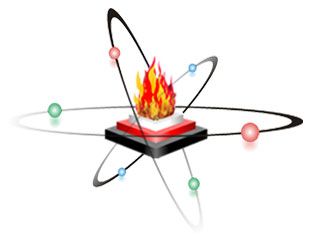Literally the term YAJNA denotes sacrifice. In Physical terms, Yajna is a process aimed at the refinement of the subtle energy existing in matter with the help of sound and thermal energy of Mantras (Vedic hymes). Generally Yajna are of two types as explained in revealed Scriptures, namely AGNIHOTRA or HAVAN and Next NAMA SANKIRTANAM yajna (also called a Yuga Dharma for this age), which is prescribed to be followed by all human beings in this age. In this Article we will be revealing the hidden science of Agnihotra or Havana generally understood as Yajnam. The knowledge of philosophy and science of yajna is essential for understanding and experimenting the science of spirituality as knowledge of elementary physics as for material science.
Basically performing yajna the two energies, heat from yajna fire and sound from mantras like gayatri, suktas, stotatras etc (Basic energy systems in physical world: Heat energy and Sound energy) are combined to achieve the desired physical, psychological and Spiritual benefits.
The fumigation of specific substances in the yajna: Fire is scientific method of subtulisation of matter into energy and expanding its potential and positive effects in the sorrounding atmosphere. The electromagnitic waves generated thereby help in trinsmiting, at the cosmic level, the desired sonic signals of mantras, which are chanted during the process of sacrificing the special materials called Charu in the fire.
There are innumerable environmental, physical, mental and spiritual benefits are there in yajna, which cannot be discussed all in this small article where as some scientific facts present in the yajna are beyond our describing and conceiving capacity. Since today is World Enviroment Day, So here remaining within the topic we have tried to explain and explore some general biological-enviromental aspects of yajna which are infact the neglegable besides its real spiritual effects:
- Yajna for agriculture, physical, mental, spiritual, intellectual and environmental well being
Bhagavad Gita 3.14 says
annäd bhavanti bhütäni parjanyäd anna-sambhavaù
yajïäd bhavati parjanyoyajïaù karma-samudbhavaù
All living bodies subsist on food grains, which are produced from rains. Rains are produced by performance of yajïa [sacrifice], and yajïa is born of prescribed duties.
Similarly, The hymns (Mantra) nos. 1 to 29 in chapter 18 of the Yajur Veda describe Yajna as the basis of good agriculture, physical, mental and spiritual and intellectual progress, prosperity in the botanical kingdom of the earth, prosperity in food and cereals produce, good health and pure environment through removal of pollution.
The industrial wastes, rapid urbanization, deforestation, air and water pollution, disturbances in the ozone layer, radioactive waves etc have destabilized the human, animal and plant cycle (eco cycle). The ecological imbalance caused by these acts of so-called civilized beings has resulted into disastrous threat not only to living being but to whole on our planet. Till today it’s being accepted of making compelled to accept that research into modern physical science can furnish answer to all humans problem, but instead we are finding increasing number of diseases including malfunctioning of body organs due to increasing severity of pollution in the atmosphere. Aliments like sunburn, skin cancer, cataracts and weakening of immune system are common due to Ozone depletion. An experimental study shows that the incidence of physical ailments, sickness and disease are reduced in the houses where the yajna is regularly performed because it creates a pure, nutritional and medicinal atmosphere. It renews brain cell, revitalizes the skin, purifies blood and prevents growth of pathogenic organisms.
“Heal the atmosphere and the healed atmosphere will heal you”, actually yajna is the healing process. The antiseptic and antibiotic effects of the smoke of Yajna have also been examined by conducting laboratory experiments on rabbits and mice and it has been established that smoke emitted in Yajna is a powerful antibiotic. Agnihotra ash is also found to purify and cleanse the water, making it fit for drinking. There are non-bacterial parasites like flies, ringworm, dice fleas etc., which are normally difficult to deal with since bactericides which can be used against them are also harmful to other living organisms. Such insects are generally immune to ordinary reagents. However they either get killed or are driven away when they come in contact with volatile oils like camphor, which are diffused in the environment during the performance of Yajna.
The surroundings and the smell of a Yajna can be smelt even at a huge distance. In addition to steam, smoke is also given out in plentiful quantities and solid particles existing in a highly divided state offer adequate surface for mechanical diffusion. Thus smoke also functions as a medium for circulation of aromatic substances depending on temperature and direction of the wind. This aromatic and disinfection of air is not only useful to animal life but it also helps plant life. The aromatic substances, which get diffused in the air through Agnihotra offer protection to plant life against harmful organisms. This ensures a healthy plant growth. Agnihotra’s atmosphere and ash can be used as adjuvants in the natural farming methods – also known as the agnihotra farming methods. It is a holistic concept of growing plants in pure and healthy atmosphere and balancing the ecological cycles by performing Yajna in the middle of the farm and using the Yajna-ash as a fertilizer. Several experiments have been conducted in the East European countries on the use of Yajna ash in soil treatment. These, too, have shown positive effects and potential applications in Agriculture.
The oxidation of hydrocarbons also produces formic acid and acetic acid both of which are good disinfectants. Use of formic acid for preservation of fruits and that of acetic acid in preserving vinegar is a common practice. The antiseptic and antibiotic effects of fumes of Yajna have also been examined by conducting suitable experiments and it has been established that fumes emitted in Yajna are powerful antibiotic.
Under products of combustion, the partial oxidation of hydrocarbons and decomposition of complex organic substances produce formaldehyde, which is a powerful antiseptic. It is also interesting to note that the germicidal action of formaldehyde is effective only in the presence of water vapor, which is also produced in large quantities in Yajna. The use of formaldehyde sprays for disinfecting of walls, ceilings etc., is common and such an effect is automatically produced when Yajna is performed. The observation of some distinguished scientists is note worthy in this regard:
Dr. Hafkine mentions: “Mixing ghee and sugar and burning them creates smoke which kills the germ of certain diseases and secretion takes place from some glands relate to wind pipe, which fill our heart and mind with pleasure.
Substances present in charu have great power to purify the atmosphere. It kills the germs of TB, measles, smallpox, cowpox. Remarks Dr. Tilward.
Dr. Shirowich, a Russian Scientist claims: 1. Cow’s milk contains great power of protection from atomic radiation, 2. Houses with cow dung covered floor enjoys complete protection against atomic radiation, 3. If cows ghee is put into Yajna fire, Its fumes lessen the effects of atomic radiation to a great extent.
It had been explained in ayurVeda as well as medically also verified that the atmosphere surrounding the place where a Yajna is being performed and the ash produced in the Yajna kunda has been found useful in healing nervous systems disorders, asthma, heart diseases, lung infection, a wide verity of skin diseases, and eye, ears related disorders. Analysis of ash of yajna has indicated that it contains certain ingredients which soothe, pacify and tranquillize the mind.
- Removal of Foul Odors:
The tempreature attained in the kunda varies between 250degree to 600degree, while in actual flame it might goes up to 1300 degree Celsius. The boiling points of volatile constituents get diffused over in surrounding atmosphere. Also when cellulose and other carbohydrates undergo combustion, steam is formed in copious quantities by the combination of hydrogen of organic substances with the oxygen.
Under steam volatilization, the various volatile oils get diffused in the surrounding atmosphere along with steam and smoke. Since these oils have distinctly good smells, the foul odors are automatically neutralized. This aroma can be effortlessly smelt in the surroundings when Yajna is performed. It is due to the diffusion of substances like thynol, eugenol, piene, terpinol and oils of sandalwood, camphor and clove.
- Photochemical Process:
Ghee helps in rapid combustion of cellulose of wood and keeps the fire alight. When all the volatile substances are diffused in the surrounding atmosphere, these are further subjected to photochemical reactions in the sunlight. These changes occur in the ultra-violet and other short wavelength regions. The products of fumigation thus go to photochemical decomposition, oxidation and reduction. To some extent even co2 is also reduced to formaldehyde as follows:
CO2 + H2O + 112,000 cal = HCHO + O2
From an environmental angle, the reduction of CO2 caused by Yajna as explained above and the liberation of oxygen cannot be overemphasized. Similar kinds of other useful reactions take place in the presence of specific radiations from the sunrays. This may be perhaps the reason it has been recommended that Yajna should be performed during sunlight.
The wood and fossil burning in atmosphere is always controversial because of the generation of carbon monoxide and carbon dioxide and a consequent increase in the ‘green house’ effect. On this basis it can be argued that Yajna also produces CO and CO2. It should be noted here that the way in which the samidhás are burnt in Yajna is a process of slow combustion. It is not comparable to the burning of coal in the factories or household fire or running of steam engines etc, where oxygen is sucked in large quantities and CO2 is emitted likewise. In the slow combustion process that takes place in Yajna, a small quantity of O2 is utilized and CO2 is emitted in a quantity that poses no threat to the environment. In fact whatever CO2 is generated is readily absorbed by the surrounding plant life and vegetation and thus the CO2 cycle is strengthened.
Another important fact to be noted is that CO2 produced in Yajna is not free CO2. It is mixed with the vapors of other aromatic oils and antiseptic products. It acts as a vehicle in transporting such products to the surroundings. The use of CO2 as a cerebral stimulant to assist patients suffering from lack of ventilation is a common practice in the medical field. Its use in controlling and curing many mental disorders is also known to medical science. Small amounts of CO2 inhaled by the persons performing Yajna act as a stimulant for inhaling more and more aromatic fumes which helps in curing mental disorders.
- Chanting of Mantra
The power of sound vibrations is long since acknowledged in the field of science. These vibrations can penetrate the energy spheres at the subtle and cosmic levels. All the alphabets of the Sanskrit language are endowed with special vibrational powers, which set out harmonious wave patterns when pronounced. It is interesting to note that an American Scientist Dr. Howard Steingull has established that recitation of Gayatri Mantra produces 110,000 sound waves per second.
The heat and sound endowed in Yajna is a source of immense energy. As this fire inflames, melts or sublimates all the gross substances inside, we too should burn out all our vices, ill-tendencies, lethargy, dullness and despair and energize our personality with the warmth of new zeal, alacrity, awareness and hope. The heat and energy of the Yajna should be reflected in the active flow of our blood, our industriousness and our nimble and vigilant courage to fight against six enemies inside us and lead oneself above all this material platform to the higher consciousness. However in physical laboratory, it is not possible to demonstrate the spiritual fascinating achievements of mantra and yajna because these things are to be realized by oneself but still neurophysiological effects of mantra in yajna can be tested in lab and had been studied by different scientist which are ranked unique achivement of the modern age.
Dr. Slevamurthy in his study has observed neurophysiological effects of the mantra. In his experimental study, 8 healthy men were chosen as subjects. They use to report at 4 pm on two consecutive days. Both days Yajna were performed but first day instead of prescribed mantra, some irrelevant syllables were uttered at specific time periods and second day yajna was performed with proper mantras. Both days recording of physiological parameters viz. Heart rate, ECG, EEG, GSR, BP were made.
Yajna, significant changes occured after the proper Yajna. These included 1. GSR remained significantly higher due to proper yajna. 2. ECG showed shift in base line. 3. EEG showed alpha enhancement and delta suppression for more than 15 minutes.
Now the science of medicine has begun to recognize the role of psychology in prevention and cure of malady. As the atmosphere, prana(Vital energy) and mind are interlinked, the individuals automatecially experience relaxation, peace, unburdening of mind, loss of worries and stress in the yajna atmosphere. The increase in level of Prana in Yajna atmosphere was recorded with the help of Kirlian photographs of human hands in the experiment conducted by Dr. Matthias Ferbinger of Germany.
As we have already mentioned in beginning the above stated facts and effects are infact neglegable besides yajna’s real spiritual effects. Research and also discourse and workshops on all these aspects of yajna are being conducted in different places of the world as well as in the labotory of Jagannath Foundation-SRPV in Nepal also. It might well lead to the development of a scientifically established yajnapathy which may not only be honoured but will be established as a boon for modern society and Humanity from the Vedic Scriptures and its followers.
(Extracted from talk delivered by author on World Enviroment Day 2013, published on review Nepal)
From the Book “Origin of Science”
Hare Krishna
Views: 92































Origin of Science
Acharya Kaṇāda: The Ancient Sage Who Discovered the Atom
Evidence of Vedic Sanātana Hinduism as a Global Dharma
Perception of Quantum Gravity and Field Theory in the Vedas
String Theory as Mentioned in Veda
Sanskrit’s Role in Advancing AI: A Comprehensive Study
The Vedic Model of the Mind: A Contemporary Exploration
Vedic Contributions to Geometry: Unveiling the Origins of Mathematics
Matter and Consciousness in Achintya Bhedābheda: Bridging with Quantum Physics
A Comprehensive Study of Aeroplanes and Aviation in Vedic Literature
Hydrology and the Water Cycle in Vedic Scriptures
Vedic Insights on the Speed of Light
Mysteries of Photosynthesis in Vedic Scriptures: A Journey through Ancient Wisdom